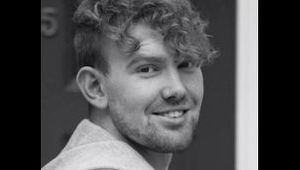
RCRD: A Conversation with Gwilym Gold

London-based artist Gwilym Gold sat down with RCRD for a coffee to discuss its current projects and its last release 'A Paradise'. Playing with music and technology, he tells RCRD more about composing its first solo album, and creating an intriguing music format called Bronze.
Hi Gwilym. 'A Paradise' is your debut album. It sounds very mature. Is it your first attempt in making music?
I’ve been doing music for a while now, but it was not necessarily recorded. I started off playing the piano as a jazz player, mainly improvising music. I then started playing in some bands such as Golden Silvers, before focusing on my solo project under the name of Gwilym Gold.
A Paradise is not really an album. It is a very singular piece, because it also involves a software which enables the album to exist. Thanks to an app, the songs of the album regenerate every time you listen to them.
Tell us more about Bronze, this new music format you’ve created.
It’s basically a new system for music, which enables musicians to create music that re-generates every time it plays back. With my producer Lexxx, we couldn’t find any existing system that worked with the power and flexibility we wanted to work with. We’ve created Bronze to generate music in all the different ways possible, only using one tool. You can make something that is completely different in term of its form every time you play it. Or, you can make something that has a very strict form, and as a compound, all the details are regenerated.
The software has two sides. It first entails a compositional tool, which is a software to make music, and then entails a player – a playback system – that enables people to listen to the music that you’ve made in that system.

Technically, how did you do that ?
Lexxx was already making its own music softwares. When I proposed him to do this album in this way, he started building the first prototype. We took it to the Head of Creative Computing at Goldsmith College, who helped to put a team together to work on the app itself and release it on iOS.
How did you came up with that idea ? Were you frustrated by the current digital music tools ?
It was a kind of response to the overwhelming casualness of what can often be the listening of music. You don’t necessarily engage with it. We wanted to create something with which people would completely engage with, not just purely listening to it. The composition tool also add a sort of liveness and vitality to music.

Musically, we can hear the piano on every song in A Paradise…
I love the piano. It’s the instrument of all the instruments, you can do everything with it. But even with my background as a pianist, I never had my own piano. Lexx bought me a piano for my birthday – an amazing one. That was the first time I had my own piano in my room ! I guess that’s partly one of the reasons why I ended up on this album focusing so much on just playing that instrument.
Did you write the whole album yourself ?
Yes, I first started with a set of songs, written quite sporadically. It’s only at the point where I wrote the song called Muscle, that I started to feel that these pieces of music had some character as a whole. I went to Lexx saying I wanted to start recording.
It was a strange project because the songs are quite simple, and the main part of the work was to refine them. We tried to see what was essential to each songs. We didn’t wanted the songs to have loads of different sounds, but only a few right elements. That process of refinement took a year on and off.
What did you wanted to express ?
Prior to doing this album, I was working on many other projects such as performances and collaborations with various artists. With this album, I felt I needed to make it a simple refined statement, without any embellishment. I think it’s because there was not other consideration to make a pure representation of the songs. I wanted to do something beautiful through its purity, rather than through its attempts to bang the door.
After creating the app and the album, what’s your plans for the future ?
At the moment we’re still developing Bronze – we’d like to make the software easier to use. And then I’d like to make some more music for it too ! I want to develop further both sides of this project – the musical side and the technologic side.
Interview/Photography by Celine Vignes.
RCRD magazine is an online magazine, edited by CORD's executive creative director Dominic Goodman, which specialises in weekly interviews with music artists both new and old, established and underground.On a quarterly basis we will be collecting our favourite interviews and publishing them in a newspaper.
We’re focusing solely on original content, initially in the form of interviews and photographs, but with a view to moving into video and live events further down the line.
To date, we have interviewed a selection of artists including Andy Stott, Empress Of, Martin Rev, Jessy Lanza, Ikonika, Haelos and Throwing Shade.
You can read RCRD here.












